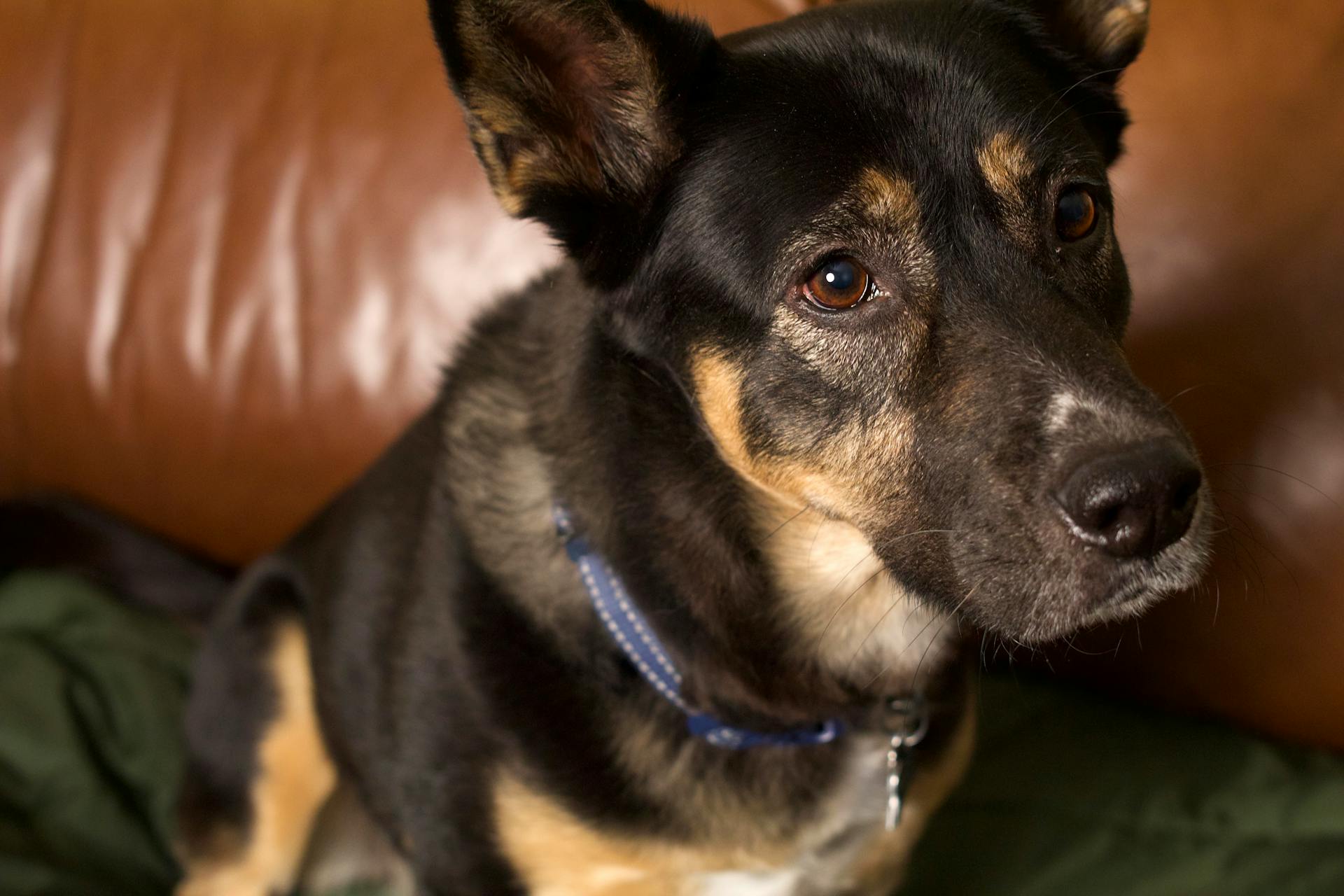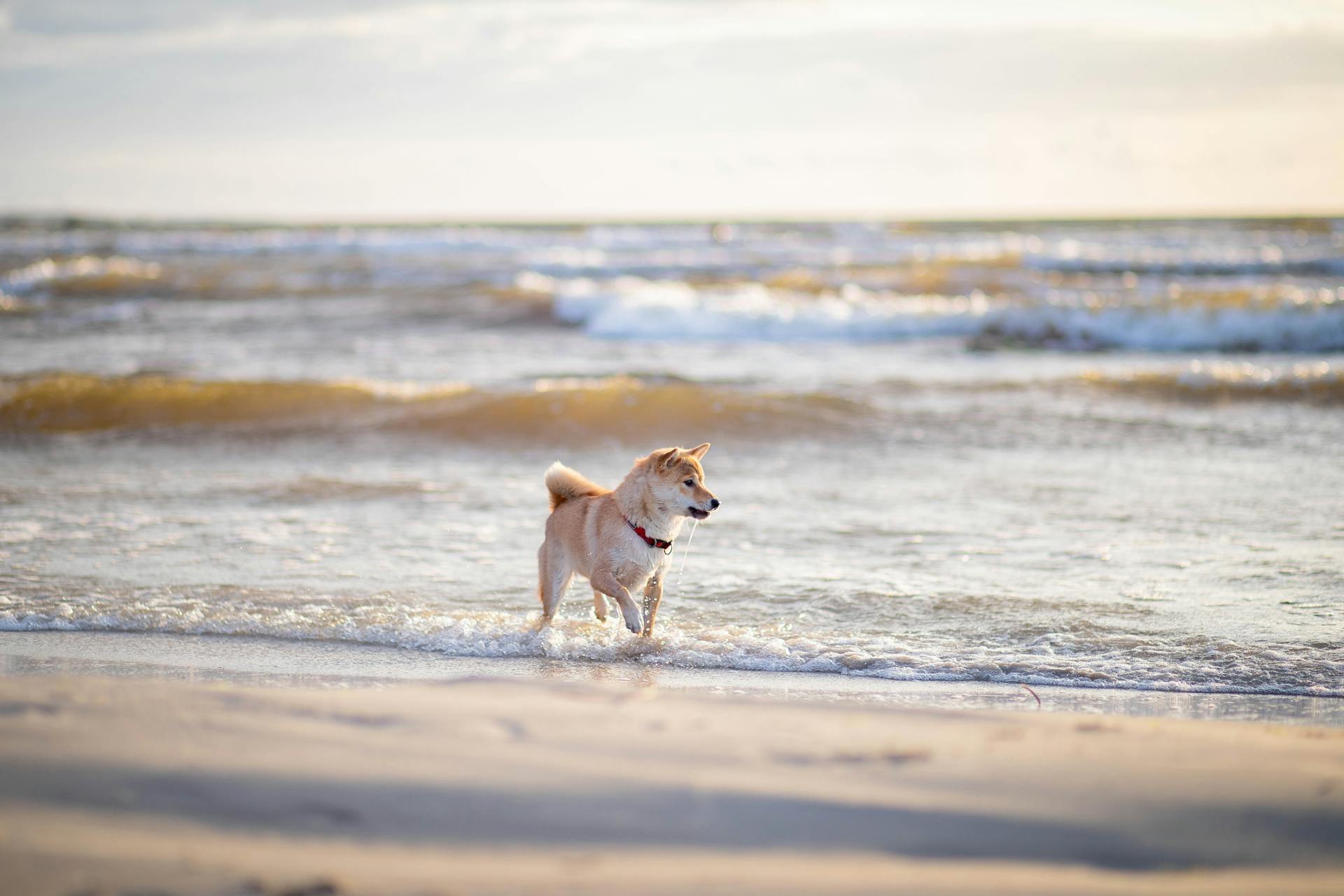
The Shorkie is a lovable mix of a Shih Tzu and a Yorkshire Terrier, known for its friendly and outgoing personality.
This adorable hybrid breed is often described as affectionate and playful, making it a great companion for families and individuals alike.
Shorkies are relatively small in size, weighing between 7 and 15 pounds, and standing between 8 and 10 inches tall at the shoulder.
Their coats can vary in color and texture, but often feature a combination of the Shih Tzu's long, flowing locks and the Yorkie's short, smooth fur.
What is a Shorkie?
A shorkie is a mix between a Yorkshire terrier and a Shih Tzu, making it a unique and charming companion.
Shih Tzus are members of the Toy Group and weigh between 9 and 16 lbs, while also being about 9 to 10.5 inches tall.
They're known for their outgoing personalities, affectionate natures, and playfulness, making them mischievous dogs with sweet expressions.
Their lapdog reputation is well-deserved, as they're perfectly happy curled up in your purse or on your lap.
As a mix of the two breeds, creating the shorkie, you've got a serious "cuteness factor" on your hands.
Shorkies inherit a blend of traits from both parent breeds, resulting in a unique and charming companion.
Their personalities are renowned for being tomboyish, energetic, and very affectionate, making them a joy to be around.
They're perfectly happy in small living spaces, but they do need regular exercise to keep them happy and healthy.
The Origins and History
The Shorkie is a relatively new breed, with its origins dating back to the 2000s in the US. It's a designer breed created by intentionally mixing Shih Tzus with Yorkshire Terriers.
The Shorkie's popularity has grown significantly in Great Britain and Ireland, where breeders have been creating them in response to demand. In fact, the breed has gained a loyal following in these countries.
The American Kennel Club (AKC) does not recognize the Shorkie as an official breed, but it is recognized by the American Canine Hybrid Club (Shorkie Tzu) and the International Designer Canine Registry. This means that Shorkie owners can register their dogs with these organizations.
Some Shorkies have ended up in shelters or the care of rescue groups, so consider adoption if you're interested in bringing one of these lovable dogs into your life. Here are some resources to get you started:
- Check your local shelters
- Look up Shorkie rescues
- Check with breed-specific Yorkshire Terrier and Shih Tzu rescues
The Shorkie's existence can be attributed to the concept of hybrid vigor, which refers to the phenomenon where crossbreeding leads to offspring that inherit a diverse array of genetic traits, enhancing their overall health and vitality. This is a deliberate effort by breeders to create a dog with the best qualities of its parent breeds.
Physical Attributes
The Shorkie's physical attributes are one of their most charming features. They typically weigh between 7 to 16 pounds.
Their compact build makes them well-suited for various living situations, including urban and suburban environments. Shorkies are small, with a height of around 6 to 14 inches at the shoulder.
Their expressive eyes are a standout feature, often reflecting a curious and affectionate nature. The Shorkie's coat can vary in texture from silky to wiry, showcasing a range of colors inspired by their parent breeds.
Shorkies can weigh as little as 5 pounds or as much as 15 pounds, with their height ranging from 6 to 14 inches at the shoulder. Their small stature makes them a great fit for households with smaller living spaces.
Their coat comes in a variety of colors, including classic Yorkshire Terrier hues and Shih Tzu-inspired shades. The diversity in coat type and color is a testament to the hybrid vigor they inherit from their parent breeds.
Male Shorkies typically weigh between 5 to 11 pounds and stand 6 to 9 inches tall, while females weigh between 4 to 8 pounds and stand 5 to 8 inches tall.
Personality
Shorkies have a big personality in a small package, making them a high-energy lap dog that loves to cuddle and play.
They have short attention spans and can act on impulse, so early training is crucial to curb unwanted habits. Positive reinforcement is the way to go, as punishment won't work with this pampered pup.
Shorkies are prone to prey drive and may want to chase anything that moves, including birds, squirrels, and neighbor cats. They're also quite vocal and will announce visitors and the mail carrier with a loud bark.
Their loving nature makes them excellent lap dogs, always eager to be by your side and share moments of warmth. Shorkies form strong bonds with their human family members and thrive on companionship and cuddles.
They're intelligent and curious, enjoying exploring their environment and investigating new scents. This intelligence also contributes to their ability to learn commands and tricks quickly.
Shorkies are not quiet dogs, so be prepared for a furry alarm system that will alert you to any potential intruders or interesting sights and sounds.
Grooming Routine
Shorkies require regular grooming to prevent matting and tangling of their coats. Their coats can range from silky to wiry, so it's essential to brush them several times a week to keep them looking their best.
To prevent matting and tangling, brush your Shorkie's coat several times a week. You can use a breed-specific brush designed for Shih Tzus or Yorkies.
Trimming their nails is also crucial, as long nails can click against the floor. You should trim your Shorkie's nails before they get too long, usually once or twice a month.
Maintaining good dental hygiene is also essential, as Shorkies are prone to dental disease. Brush your Shorkie's teeth daily, as small breeds are more susceptible to dental issues.
Here's a list of grooming tasks to include in your Shorkie's routine:
- Brush their coat several times a week
- Trim their nails once or twice a month
- Brush their teeth daily
- Check their ears daily and clean them as your vet recommends
Regular grooming will help keep your Shorkie looking and feeling their best.
Exercise and Nutrition
Shorkies need a balanced and nutritious diet tailored to their size, age, and activity level. Consult your veterinarian to determine the right food and portion sizes for your furry friend.

Daily walks, playtime, and mental stimulation are essential to keep your Shorkie's mind sharp and body active. Engaging in interactive games and short training sessions can make a big difference in their overall health and happiness.
To avoid overfeeding your Shorkie, follow the manufacturer's instructions for portion size - most recommend a cup to a cup and a half of kibble daily, divided into two meals. This will help prevent bloat and other issues related to eating too fast.
Exercise and Activity
Exercise and Activity is crucial for Shorkies, as they have moderate energy levels and need daily walks to keep them active. A 30-minute walk is a great starting point.
Playtime is also essential, so make sure to set aside time each day for interactive games and fun activities. Shorkies enjoy short training sessions, which help keep their minds sharp and bodies active.
Engaging in daily exercise not only benefits your Shorkie's physical health but also their mental well-being. By providing regular mental stimulation, you can help prevent boredom and stress.
Nutrition and Diet
Feeding your Shorkie the right amount of food is crucial for their health and vitality. Consult your veterinarian to determine the appropriate portion sizes and types of food for your dog.
Shorkies are small breeds and their frames don't handle extra weight well. Overfeeding can lead to obesity, joint problems, diabetes, and more.
You should feed your Shorkie no more than a cup to a cup and a half of kibble daily. This serving size should be divided into two separate meals.
Shorkies will inhale their food if you let them, so it's essential to keep track of portion size and how often you feed them. This will help prevent bloat and issues related to eating too fast.
Training Your
Training your Shorkie requires patience and a calm approach. Keep training sessions short, no longer than 15 minutes, to keep them engaged.
Start with potty training before moving on to other basic commands like "sit" and "stay." Focus on one command at a time to avoid overwhelming your Shorkie.
Their intelligence and eagerness to please make them responsive to positive reinforcement training methods. Use treats, praise, or affection to reward desired behaviors.
Early socialization is crucial for your Shorkie to develop into a well-adjusted and confident adult. Expose them to various people, animals, environments, and situations to help them feel comfortable and secure.
Shorkies respond well to positive reinforcement, which involves rewarding desired behaviors with treats, praise, or affection. This approach encourages them to repeat those behaviors in the future.
Training sessions should be short and engaging, focusing on one command at a time. Gradually increase the level of difficulty as your Shorkie becomes more proficient.
Common Issues and Considerations
Shorkies are generally robust dogs, but they can be prone to certain health issues. These problems can be remedied with a healthy diet.
Dental issues are a common concern, especially considering their terrier heritage. Regular veterinary check-ups and a healthy lifestyle can help mitigate potential health concerns.
Shorkies can also be susceptible to weight problems, particularly obesity. This is because their frames don't handle extra weight well, leading to joint problems, diabetes, and more.
A healthy weight range for Shorkies can vary, typically between 7 and 15 pounds. However, it can be hard to determine the right weight for your individual dog.
Some potential health issues associated with Shorkies include kidney stones, liver diseases, progressive retinal apathy, patellar luxation, hypoglycemia, and collapsed trachea.
Health Considerations
Shorkies are generally robust dogs, but like any breed, they can be prone to certain health issues. Regular veterinary check-ups and a healthy lifestyle can help mitigate potential health concerns.
Dental problems are a common issue among Shorkies. Gum disease, tooth loss, and tooth decay can occur if your Shorkie eats soft food instead of dry kibble.
A healthy diet is essential to prevent dental problems. Feeding your Shorkie a healthy dry kibble can help avoid these issues.
Regular doggie toothbrushing is also crucial for maintaining excellent oral hygiene. This will keep your Shorkie's smile sparkly, their breath pleasant, and their teeth cavity-free.
In addition to dental problems, Shorkies may also be prone to patellar luxation and eye conditions. These issues can be mitigated with regular veterinary check-ups and a healthy lifestyle.
Family and Lifestyle
Shorkies are ideal family companions due to their affectionate nature and adaptability. They thrive on being part of the family unit, sharing in the joys and experiences that life brings.
Their loyalty and affection create a bond that resonates deeply with their human companions, making them treasured members of families seeking a loyal and charming companion.
Shorkies are well-suited for families of all sizes, bringing a unique and heartwarming presence to households of all configurations. They are a delightful fusion of affection, playfulness, intelligence, and adaptability.
However, Shorkies can be easily injured by overly excited children, so it's essential to supervise child interactions. They are also territorial and may feel confrontational with animals they don't know.
Proper introductions are crucial when introducing Shorkies to other pets, and they may not feel comfortable around kids they don't know. They are affectionate with family members but may require time to warm up to new people.
Their small size and adaptability make them well-suited for various living situations, whether it's a cozy apartment or a spacious home with a yard. They find contentment as long as they're surrounded by the love and attention of their family members.
Shorkies shine as delightful family companions that bring love, laughter, and a special kind of warmth to any household. Their affectionate nature, adaptability, and playful spirit make them well-suited for families of all configurations.
Cost and Ownership
The cost of owning a Shorkie can add up quickly, with the initial purchase price ranging from $400 to $1,200 or more.
Your Shorkie's medical needs per year can cost anywhere from $450 to $600, which includes shots, insurance, check-ups, and flea prevention.
Spaying or neutering your Shorkie can set you back at least $100, but it's a necessary expense to prevent unwanted breeding and reduce health risks.
Food, treats, toys, grooming necessities, and training can cost around $500 to $700 a year, which is a significant ongoing expense.
On average, you can expect to pay between $500 to $1,500 for a Shorkie puppy, but this price range can vary depending on factors like breeder reputation and the puppy's quality.
Reputable breeders who prioritize their dogs' health and well-being may charge higher prices to cover their costs, but it's worth the investment for a healthy and happy companion.
Expand your knowledge: Puppy Cut Shorkie
Breed Information
The Shorkie is a cross between a Shih Tzu and a Yorkshire Terrier, making it a small but spunky companion.
They typically weigh between 7-15 pounds and stand 6-10 inches tall.
Shorkies are known for their friendly and outgoing personalities, often forming strong bonds with their owners.
Their coats can be a combination of the Shih Tzu's long, flowing fur and the Yorkie's short, dense coat, requiring regular grooming to prevent matting.
In terms of exercise, Shorkies are relatively low-maintenance, requiring short, daily walks and playtime to keep them happy and healthy.
Yorkshire Terrier
The Yorkshire Terrier is a breed with a rich history, originating in 19th century England.
This small dog was originally used for hunting and killing vermin, earning it the nickname 'ratter'.
The American Kennel Club recognized the Yorkshire Terrier as an official breed in 1878.
Yorkies are known for their energy, loyalty, and courage.
They come in a variety of color combinations, including silver-blue, golden, and pale cream.
Their coat is smooth, glossy, and perfectly straight.
Choosing a Breed
Shorkies can live for at least a decade, making it a long-term commitment to adopt a puppy.
This breed isn't happy when left alone for many hours a day, which can lead to destructive behaviors.
You can minimize the likelihood of health issues by working with a responsible, reputable breeder.
These breeders work hard to develop the healthiest, most robust animals possible.
Some potential health problems in Shorkies include kidney stones, liver diseases, and patellar luxation.
You can find reputable breeders by doing online research or visiting local kennels to see how puppies behave in person.
Here are some potential health issues to consider:
- Kidney stones
- Liver diseases
- Patellar luxation
- Hypoglycemia
- Collapsed trachea
- Progressive retinal apathy
Frequently Asked Questions
What size is a full grown shorkie?
A full-grown shorkie typically weighs 5-12 pounds and stands 6-11 inches tall. This small size makes them a great companion for many families.
What is the average lifespan of a shorkie?
The average lifespan of a Shorkie is 12-15 years, influenced by factors like diet, health, and lifestyle. With proper care, some Shorkies can live up to 18 years.
What do shorkies look like fully grown?
Fully grown shorkies are small to tiny dogs with a muscular build, thin legs, and a distinctive triangular face. They typically have a curled tail and triangular ears that add to their alert and endearing appearance.
Is a shorkie a rare breed?
Yes, Shorkies are considered a rare breed due to their relatively recent development and limited availability. Their uniqueness makes them a highly sought-after addition to many families.
Do shorkie dogs bark a lot?
Yes, Shorkies tend to bark at minor disturbances, making them suitable as watchdogs but potentially noisy companions.
Featured Images: pexels.com


